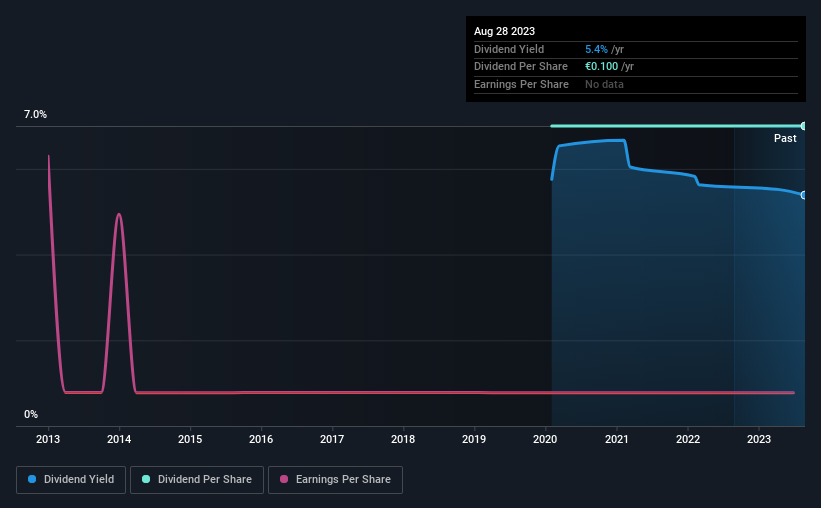- Sweden
- /
- Real Estate
- /
- OM:AKEL D
Akelius Residential Property (STO:AKEL D) Has Affirmed Its Dividend Of €0.025

Akelius Residential Property AB (publ) (STO:AKEL D) has announced that it will pay a dividend of €0.025 per share on the 10th of November. This makes the dividend yield 5.4%, which will augment investor returns quite nicely.
Check out our latest analysis for Akelius Residential Property
Akelius Residential Property's Distributions May Be Difficult To Sustain
We like to see robust dividend yields, but that doesn't matter if the payment isn't sustainable. Akelius Residential Property isn't generating any profits, and it is paying out a very high proportion of the cash it is earning. This makes us feel that the dividend will be hard to maintain.
Over the next year, EPS might fall by 74.0% based on recent performance. This means the company won't be turning a profit, which could place managers in the tough spot of having to choose between suspending the dividend or putting more pressure on the balance sheet.

Akelius Residential Property Doesn't Have A Long Payment History
The company has maintained a consistent dividend for a few years now, but we would like to see a longer track record before relying on it. The most recent annual payment of €0.10 is about the same as the annual payment 3 years ago. Akelius Residential Property hasn't been paying a dividend for very long, so we wouldn't get to excited about its record of growth just yet.
The Dividend Has Limited Growth Potential
The company's investors will be pleased to have been receiving dividend income for some time. However, things aren't all that rosy. Over the past five years, it looks as though Akelius Residential Property's EPS has declined at around 74% a year. A sharp decline in earnings per share is not great from from a dividend perspective. Even conservative payout ratios can come under pressure if earnings fall far enough.
Akelius Residential Property's Dividend Doesn't Look Great
In summary, while it is good to see that the dividend hasn't been cut, we think that at current levels the payment isn't particularly sustainable. The company isn't making enough to be paying as much as it is, and the other factors don't look particularly promising either. Considering all of these factors, we wouldn't rely on this dividend if we wanted to live on the income.
Market movements attest to how highly valued a consistent dividend policy is compared to one which is more unpredictable. However, there are other things to consider for investors when analysing stock performance. For example, we've picked out 3 warning signs for Akelius Residential Property that investors should know about before committing capital to this stock. If you are a dividend investor, you might also want to look at our curated list of high yield dividend stocks.
New: Manage All Your Stock Portfolios in One Place
We've created the ultimate portfolio companion for stock investors, and it's free.
• Connect an unlimited number of Portfolios and see your total in one currency
• Be alerted to new Warning Signs or Risks via email or mobile
• Track the Fair Value of your stocks
Have feedback on this article? Concerned about the content? Get in touch with us directly. Alternatively, email editorial-team (at) simplywallst.com.
This article by Simply Wall St is general in nature. We provide commentary based on historical data and analyst forecasts only using an unbiased methodology and our articles are not intended to be financial advice. It does not constitute a recommendation to buy or sell any stock, and does not take account of your objectives, or your financial situation. We aim to bring you long-term focused analysis driven by fundamental data. Note that our analysis may not factor in the latest price-sensitive company announcements or qualitative material. Simply Wall St has no position in any stocks mentioned.
About OM:AKEL D
Akelius Residential Property
Through its subsidiaries, owns, manages, rents, restores, and upgrades residential properties in the United States, Canada, and Europe.
Low unattractive dividend payer.

